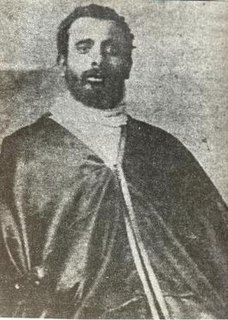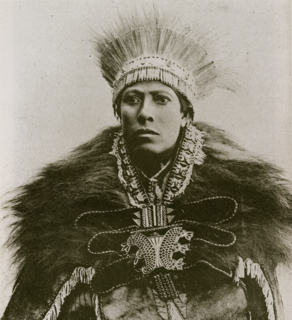Related Research Articles
The Battle of Maychew was the last major battle fought on the northern front during the Second Italo-Abyssinian War. The battle consisted of a failed counterattack by the Ethiopian forces under Emperor Haile Selassie making frontal assaults against prepared Italian defensive positions under the command of Marshal Pietro Badoglio. The battle was fought near Maychew, Ethiopia, in the modern region of Tigray.

RasMakonnen Wolde Mikael Wolde Melekot, or simply Ras Makonnen, also known as Abba Qagnew was a Shewan royal from Menz, a military leader, the governor of Harar province in Ethiopia, and the father of Tafari Makonnen. He is ethnically Amhara. His father was Fitawrari Makonnen and was a grandson of Negus Sahle Selassie of Shewa through his mother, Leult Tenagnework Sahle Selassie. As such, he was a first cousin of Emperor Menelik II.

RasDesta Damtew was an Ethiopian noble, an army commander, and a son-in-law of Emperor Haile Selassie I.

Ethiopian forces in the Second Italo-Abyssinian War besides the Central Army were mobilized from various provinces under their local leader. According to 1935 Italian intelligence estimates of the Ethiopian provinces and their forces on the eve of hostilities, the Ethiopians had an army of 350,000 men. Strengths where known are noted followed by their leader. Modernized forces in Bold.

RasMulugeta Yeggazu was an Ethiopian government official. He served as Imperial Fitawrari, Commander of the Mahel Sefari of the Ethiopian Army during the Second Italo-Ethiopian War.

DejazmachBalcha Safo , popularly referred to by his horse-name Balcha Aba Nefso, was an Ethiopian military commander and lord protector of the crown, who served in both the First and Second Italo-Ethiopian Wars.

The March of the Iron Will was an Italian Fascist propaganda event staged from 26 April to 5 May 1936, during the final days of the Second Italo-Ethiopian War. The goal of the march was to capture the Ethiopian capital in a show of force. An Italian mechanized column under the command of Pietro Badoglio, Marshal of Italy, advanced from the town of Dessie to take Addis Ababa. The march covered a distance of approximately 200 miles (320 km).
De Bono's invasion of Abyssinia took place during the opening stages of the Second Italo-Abyssinian War. Italian General Emilio De Bono invaded northern Abyssinia from staging areas in the Italian colony of Eritrea on what was known as the "northern front."

Seyoum Mengesha KBE was an army commander and a member of the royal family of the Ethiopian Empire.

NegusMikael of Wollo, was an army commander and a member of the nobility of the Ethiopian Empire. He was the father of the "uncrowned" Emperor Lij Iyasu, and the grandfather of Empress Menen, wife of Emperor Haile Sellassie. He changed his name to Mikael upon converting to Christianity.

Gugsa Araya Selassie was an army commander and a member of the royal family of the Ethiopian Empire.
The Battle of Anchem was a battle fought between two factions of the Royal family in the Ethiopian Empire. The battle was fought to determine who would rule the empire, Empress Zewditu or King (Negus) Tafari Makonnen.
Wondosson Kassa, also known as Wond Wossen Kassa, was a member of the royalty of the Ethiopian Empire, an army commander, and a patriot.
Hailu Tekle Haymanot, also named Hailu II of Gojjam, was an army commander and a member of the nobility of the Ethiopian Empire. He represented a provincial ruling elite who were often at odds with the Ethiopian central government. Hailu Tekle Haymanot was an independent-minded potentate who, throughout his life, was mistrustful of and mistrusted by the Emperor.
Nasibu Zeamanuel, also Nasibu Zamanuael or Nasibu Emmanual in some texts, was an army commander of the Ethiopian Empire. Along with his brother Wasane, historian Bahru Zewde groups Nasibu "among the most colourful of the first-generation intellectuals" of Twentieth-century Ethiopia. His maternal grandfather, Azaz Emmanual Wolde Malakot, whose name both brothers came to adopt, was a notable courtier of Emperor.
Gugsa Wale's rebellion of 1930 was a rebellion raised by Ras Gugsa Wale and by supporters of Empress Zewditu to rid her of the Crown Prince and heir apparent, Negus Tafari Makonnen. With Tafari gone, Zewditu would be the sole claimant to succession as the ruler of the Ethiopian Empire. As the husband of Empress Zewditu, Gugsa Wale expected to become Emperor.
Afawarq Walda Samayat, or Afework Woldesemait, was an Ethiopian administrator and commander.
Major-General DejazmatchBeyene Merid was an Ethiopian army commander, a patriot, and the son-in-law of Emperor Haile Selassie I.
Ayalew Birru, or Ayyalaw Birru, was an Ethiopian army commander, a patriot, and a cousin of Emperor Haile Selassie I.
Adefrsew Yenadu (1873–1950) was an army commander, a member of the nobility of the Ethiopian Empire, and a patriot.
References
- Barker, A.J. (1971). The Rape of Ethiopia, 1936. New York: Ballantine Books. ISBN 978-0-345-02462-6.
- Haile Selassie I, Edited by Harold Marcus with others and Translated by Ezekiel Gebions with others (1999). My Life and Ethiopia's Progress: The Autobiography of Emperor Haile Selassie I, King of Kings and Lord of Lords, Volume II. Chicago: Research Associates School Times Publications. p. 190. ISBN 0-948390-40-9.CS1 maint: extra text: authors list (link)
- Marcus, Harold G. (1994). A History of Ethiopia . London: University of California Press. pp. 316. ISBN 0-520-22479-5.
- Mockler, Anthony (2002). Haile Sellassie's War. New York: Olive Branch Press. ISBN 978-1-56656-473-1.